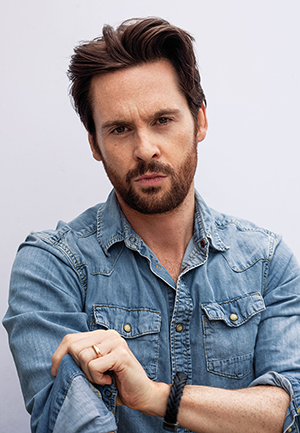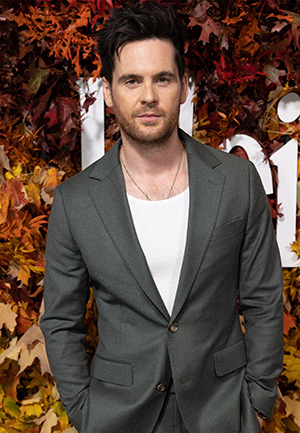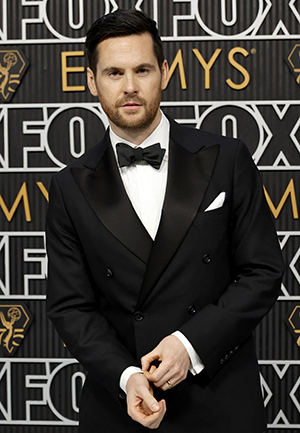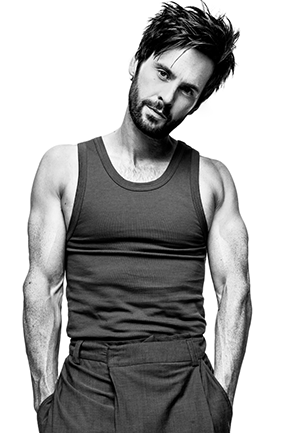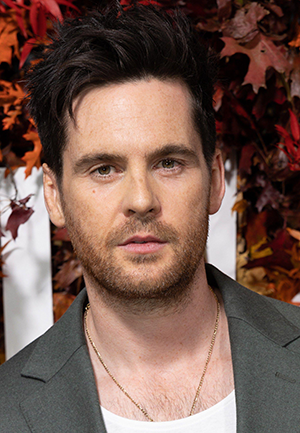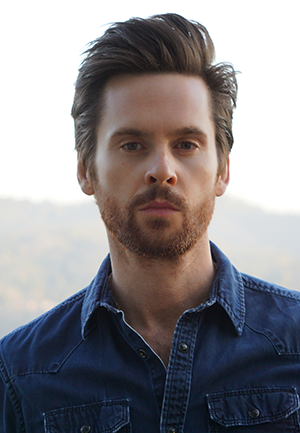A new interview with Tom Riley has been shared by British GQ magazine, in which Tom discusses his character Augustus Bidlow, and working with Joss Whedon. The Nevers begins pm tomorrow night on HBO! Image above from the Da Man photoshoot.
Tom Riley likes genre. Over his 20-year career, he’s inhabited – obviously – all manner of roles, but the two best-known remain his three-series stint as Leonardo da Vinci in the Starz period hit Da Vinci’s Demons and the troubled detective Will Wagstaffe in Dark Heart, ITV’s adaptation of crime writer Adam Creed’s potboiler novels.
“I’ve done two high-profile genre shows,” says Riley, “and both times it’s been an absolute blast. I love them.”
Which is good, because his show is so genre, it almost… isn’t. A sort of period-romance-police-procedural-fantasy-sci-fi mash-up, The Nevers defies the traditional pigeonholing that reviewers like to rely on when they write about TV.
“Steampunk meets X-Men” is how Riley describes the average elevator pitch he encounters, “and certainly, there’s elements of that to the show. But there’s more.”
Quite a lot more: The Nevers is set in London in 1899, three years after an unexplained alien event bequeaths otherworldly powers known as “Turns” to people (“the Turned”) throughout the city, seemingly at random. Our heroes are the very Victorianly named Amalia True and Penance Adair, two women who run an orphanage for girls and young women who have been Turned and whose new talents vary from divining the future to freezing things or siren-like hypnosis through singing. Others are super-sized or can speak every language on earth fluently or can see the flow of electrons and therefore harness electricity for ground-breaking inventions long before the science was properly understood (so the logic goes). Most of the Turned are female, which leads to a great tension in the series between the traditionally empowered men of status and the supposedly meek women who suddenly have the power to snap them like twigs or read their minds. But – and here follows a minor spoiler for the first episode of the series – Riley’s character Augustus Bidlow, a young aristo known as Augie for short, is one of the very few men who are Turned.
Augie is under-confident yet upper-class, privileged on paper but desperately unsure of himself and henpecked by his ferocious sister, Lavinia, the rich benefactor of Amalia and Penance’s orphanage. Riley describes Augie as a “slightly dithery weirdo”; early in the first episode of the series, James Norton’s swinging, pansexual aristocrat Hugo Swan, a frenemy of Augie, describes him as “above reproach and beneath contempt”. Torn between the expectations of society and his newfound Turn and inherent connection to the rest of the Turned, particularly Penance, he starts to reassess where he truly belongs.
“It's interesting to play, in essence, a white, privileged, upper-class man,” says Riley, “who at the same time, does not know why he has also been singled out to have a Turn.” In one early scene, Augie expresses his dismay at his Turn, having believed until that point that only women could become Turned, worrying people will perceive him as effeminate. “The real fear is, ‘Am I going to feel even more other than I already do?’”
In a sense, Augie’s arc – someone whose social position is thrown into doubt by the appearance of the Turned – is that of the first half of the entire series. And The Nevers slots in perfectly alongside new high-budget streaming offerings Enola Holmes and The Irregulars as part of a recent trend to recast the social order of the late Victorian era, putting female or non-white characters at the heart of the narrative.
Why does Riley think we’re so compelled by the period, even as we rewrite its social codes to more closely resemble those of the modern day? “There was a fear of change [in the Victorian era],” Riley says. “The speed of change was very scary. To those who were born into a world of candles, electricity was terrifying. And it feels like now it's gone from centuries of glacial pace to, suddenly, everything's going like a rocket and those who aren't prepared to grab onto it, like in Dr Strangelove, are fully terrified. I wonder if there's some reflection in that.” All of this has the effect of making The Nevers sound very high-concept and Riley is keen to emphasise that the show “does just want to be entertaining, as well”.
It is, ultimately, a flight of steampunk fancy sprung from the mind its creator, Joss Whedon, and it’s stamped with his trademark flourishes, from the pulpy subject matter to the quips and asides packed into the script and the reliance on a broad ensemble cast. Whedon created and wrote the series’ scripts and directed three of the first six episodes (a planned ten episodes were cut short by Covid-19; a further six are set to shoot later this year). The Nevers has a similar balance of playfulness and thoughtfulness to Buffy The Vampire Slayer and Firefly, Whedon’s defining TV work.
Riley hadn’t watched Buffy or Firefly before signing on to The Nevers, but he had seen Whedon’s work directing Avengers Assemble – “He managed to thread a really difficult needle at a time when no one had done that before” – and had read his run on Marvel’s Astonishing X-Men comic books in the mid-2000s. The closest British comparisons he can think of to a showrunner like Whedon are Steven Moffat and Chris Chibnall, the last two head writers on Doctor Who, which Riley appeared in as Robin Hood in a 2014 episode that saw Peter Capaldi’s Doctor travel back to 12th-century Nottingham to help him fight an army of robotic knights.
“I just love the fact that on Saturday night, there's an hour of pure imagination. Even when it doesn't work, I still love the fact that in Britain there's this wild hour that gets huge ratings. When you try to explain to people here [in Los Angeles] what Doctor Who is, they’re like, ‘What? What is that show?’ So I am definitely drawn to giant, bold, creative leaps of the mind like that.”
Of course, the idea of the all-powerful, visionary (male) creative is now a loaded one and Whedon’s case is no exception. In July 2020, Ray Fisher, a cast member on Whedon’s Justice League, detailed allegations of “gross, abusive, unprofessional and completely unacceptable” behaviour by Whedon on set, prompting a war of words between actors on the film – Jason Momoa and Gal Gadot have lent their support to Fisher’s allegations – and studio execs. Then, in February, the actress Charisma Carpenter, who played Cordelia in Buffy and Angel, tweeted an extensive account of Whedon’s alleged abusive behaviour towards her while she was pregnant, including threatening to fire her and disparaging her weight in front of other crew members. Numerous Buffy and Angel cast members have since voiced their support for Carpenter. The fallout, coupled with earlier allegations of serial infidelity by his now ex-wife Kai Cole, called Whedon’s previous sterling reputation as a progressive, feminist writer and ally into stark question. He left production of The Nevers in November 2020, citing exhaustion in “a year of unprecedented challenges” but calling the show “a labour of love”.
So what was Whedon like on set? “I’m obviously aware of the maelstrom that surrounds [this] at the moment,” says Riley, “so when I say this, I am only speaking, obviously, from my own experience and not the experiences of anyone else at whatever point in time. “I couldn’t have had a more faultless experience. That’s the truth. I obviously only speak for myself. And I think to an extent, based on our very active WhatsApp threads, for the entire cast of this show and crew of this show, it was an incredibly collaborative and safe experience. He was very soft spoken on set and very intuitive, gave brilliant notes [and] was very up for changing things if you had suggestions that he vibed with. I found it to be a pleasure.”
And what goes on in The Nevers’s WhatsApp group? “I think it’s just like every WhatsApp group on the planet. Memes. Checking in with each other. You must hear this from everyone, like” – he does his impression of the quintessential gushing celebrity — “‘Everyone’s lovely,’ but on this job, it’s actually true. It’s a really exciting and supportive group of people. Laura and Ann are delightful and so talented.” They don’t talk about reviews, though. “That doesn’t really come into it.” If they did, the memes would come thick and fast and they’d be the good sort – dancing Russians rather than dogs in flaming houses.
The Nevers has all the early signs of a cult hit, including a growing fan community on Twitter, already hooked on its heady mix of concepts and bombast. It’s not hard to imagine them morphing into vocal defenders of the series at a time when it can be hard to stand out in a crowded TV landscape. Whedon or no, they’ll be counting down the months until the next six episodes.
Comments
-
 10/Apr/2021— replyThank you for sharing this and making this accessible :-) x I simply added that Tom is 40 now and not 39 :-)
10/Apr/2021— replyThank you for sharing this and making this accessible :-) x I simply added that Tom is 40 now and not 39 :-)

